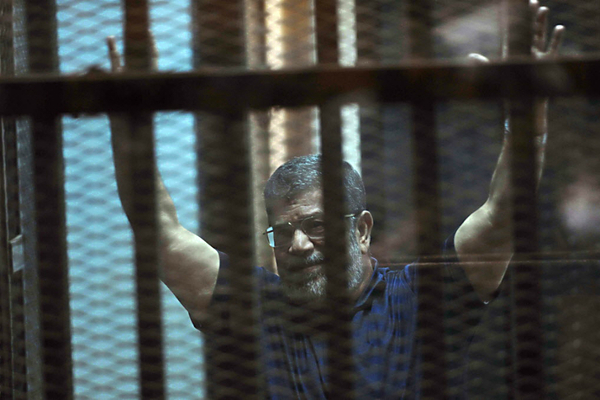
Hours after ousted former Egyptian president Mohamad Morsi was given a preliminary death sentence, three judges were killed and another seriously wounded in North Sinai when they were attacked by an armed militia while traveling to a North Sinai court.
No group has yet to claim responsibility for the attack, however the State of Sinai, formerly known as Ansar Beit Al-Maqdis, is considered to be the most active armed group operating in the area, and could be a possible culprit, according to Daily News Egypt. The group often targets those associated with state security and members of the military – and has been been fighting the government in the Sinai since Mr. Morsi’s government was removed from power in July 2013.
On Saturday, an Egyptian court sentenced more than 100 men – including Morsi – to death for escaping prison in 2011 and contributing to the toppling of Hosni Mubarak’s regime. The sentencing is likely to further agitate insurgents who are sympathetic Muslim Brotherhood.
“All the world will pay for this death sentence, will pay for their silence about the sentence, and for betraying the principles of freedom and justice,” Ahmed Ramy Elhofy, a Muslim Brotherhood co-defendant tried in-absentia, told The Guardian.
Morsi’s death penalty sentence is considered another sign that Egypt is doubling down on Islamist groups even as it fights ISIS-affiliated groups in Libya as well as in its own backyard in the Sinai Peninsula. The BBC reported that North Sinai has been in a state of emergency with a curfew since October when an insurgent attack on a security checkpoint killed dozens of soldiers. The Egyptian Army has stepped up operations to bring stability to the region, but so far the military says that the coordination and sophistication of terrorist attacks is only increasing.
Here’s how The Christian Science Monitor summed up the push-pull the Egyptian government is dealing with in its efforts to confront ISIS:
Until now, Egypt has barely registered in the US-led coalition against IS, insisting it needs to needs to reserve its military might for the fight in Sinai, which is under de facto military occupation….
While Egypt may be able to mount air raids over Libya at the same time as fighting militants in Sinai, sustained operations could prove difficult in practice. …
“It is highly unlikely it would be able to do so without stretching or exceeding its capacity,” says Zack Gold of the Tel Aviv-based Institute for National Security Studies. “Frankly, even with increased and better trained forces, we have already seen that Egypt is not sustaining operations in Sinai for an extended duration.”
Some observers are concerned that the response by the Egyptian security apparatus to militant Islamic attacks means that Egypt has slipped back into its authoritarian days. In that context, if Morsi is executed, Muslim Brotherhood supporters would take it as a provocation.
“Morsi being an Islamist leader and a symbolic figure … has to be punished harshly in order to convey the unambiguous message to all Islamists and other activists that there is no going back to the pre-June 2013 democratic transition," Yasser El-Shimy, an Egyptian academic based at Boston University told The Guardian. "Ultimately, if the verdict is carried out, it will push many Islamist youths further away from peaceful political participation, and make it virtually impossible to achieve political reconciliation in Egypt.”
Comments on Twitter are not generally in favor of the death penalty for Morsi, and even Egyptians who did not like Morsi’s politics think the sentence was excessive.
Morsi’s execution is no sure thing, and his case will likely undergo a drawn out and somewhat uncertain appeals process. It will be up to Egypt’s Grand Mufti to approve or suspend the court’s provisional sentence. Some have noted with irony that the Grand Mufti was originally appointed by Morsi himself during his one year as president.



